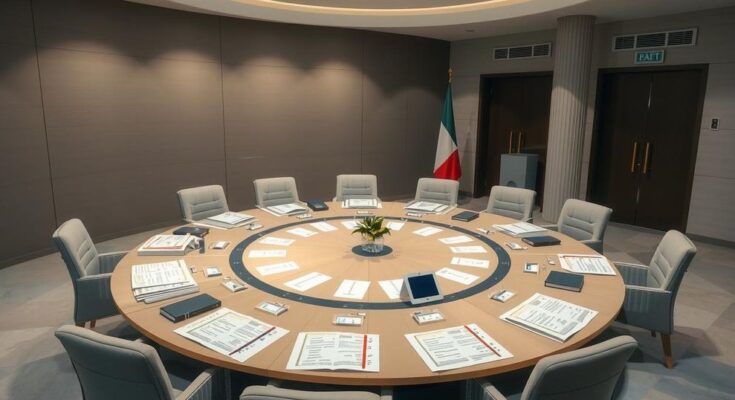Joseph Kabila, the ex-President of Congo, is engaging in talks with opposition figures about the country’s political future due to escalating threats from Rwanda-backed M23 rebels. These discussions signify challenges for current President Tshisekedi, who is criticized for his approach to the crisis. The political climate remains tense with calls for a potential transition and accountability within government actions.
Joseph Kabila, the former President of the Democratic Republic of Congo, is currently engaging in discussions with opposition politicians regarding the nation’s political future amid increasing territorial threats posed by Rwanda-backed rebels. These negotiations also include members of civil society and signify a substantial challenge for the current President Felix Tshisekedi, who has faced widespread criticism over his handling of the M23 rebel advance.
Initially, Kabila and Tshisekedi had established a power-sharing arrangement following the contentious 2018 elections. However, their relationship deteriorated, particularly as Tshisekedi accused Kabila of supporting the insurgency during a speech at the Munich Security Conference. Subsequently, Kabila responded to the crisis by publishing an op-ed alleging constitutional violations and human rights abuses by Tshisekedi’s government.
Sources indicate that while Kabila has discussed the prospect of a political transition with his aides, no definitive plans have emerged regarding this matter. Past meetings between Kabila and opposition leaders, including Moise Katumbi and Claudel Lubaya, have occurred openly; however, the ongoing discussions remain private. Katumbi’s spokesperson alluded to previous criticisms of Tshisekedi when asked for comments regarding Kabila’s outreach, and Lubaya expressed concerns regarding Tshisekedi’s focus on retaining power rather than resolving the crisis.
In a recent interview, Kabila advocated for an inclusive peace process but did not clarify his objectives. Emmanuel Ramazani Shadary, from Kabila’s party, stated the importance of adhering to constitutional guidelines during discussions about the political future, while Tshisekedi announced plans for a unity government that have yet to be realized.
The Tshisekedi government appears cautious of Kabila’s influence, blocking the movement of a Kabila-owned vessel under suspicion of potentially transporting arms to rebel factions. Notably, Nehemie Mwilanya Wilondja, Kabila’s former chief of staff, contended that there was no substantive evidence for these allegations. Meanwhile, the situation in Congo raises historical parallels to the period of Kabila’s ascent to power following his father’s assassination in 2001, marked by foreign interventions threatening the government.
In conclusion, former President Joseph Kabila’s negotiations with opposition politicians signal a significant shift in the political landscape of the Democratic Republic of Congo amidst ongoing conflicts with M23 rebels. The emerging discussions highlight the potential challenges faced by President Tshisekedi, particularly in light of public criticism regarding his administration’s efficacy. While Kabila’s intentions remain vague, the volatility of the current situation calls for urgent attention to the country’s governance and stability.
Original Source: www.usnews.com




